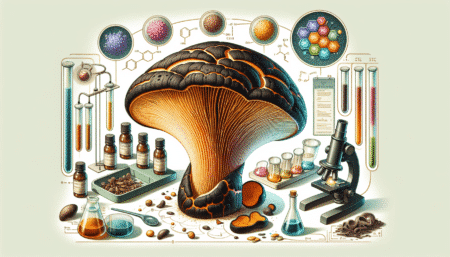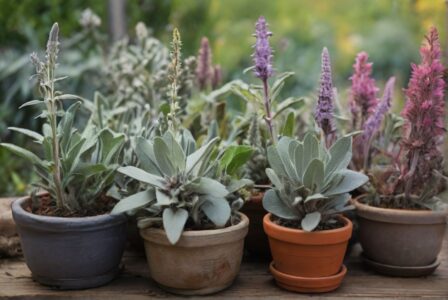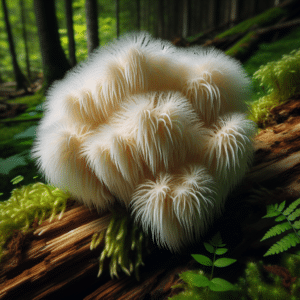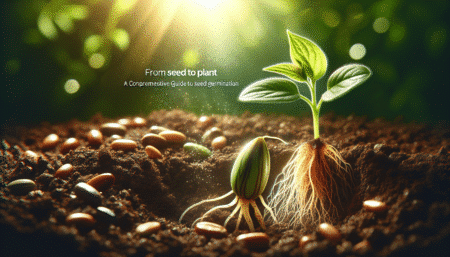- Introduction: The pineal gland and its importance for holistic health
- What is the pineal gland and where is it located in the body?
- The functions of the pineal gland and its influence on the organism
- How can you activate and stimulate the pineal gland?
- Methods for activating the pineal gland: meditation and relaxation techniques
- Important plants for activating the pineal gland
- Nutritional tips to support pineal gland function
- The influence of light on pineal gland activity
- The effects of an active pineal gland on well-being and health
- Conclusion: Holistic health through an activated pineal gland
Are you ready to discover the mysterious world of your pineal gland? The pineal gland, also known as the pineal gland or the "organic clockwork" of your brain, plays a crucial role in your sleep, health and well-being. In this blog you will find exciting information about the functions of the pineal gland, such as the production of melatonin and serotonin, as well as the effects of fluoride and darkness on this unique gland. Immerse yourself in the fascinating world of the pineal gland and find out how you can achieve holistic health by activating it.
1 Introduction: The pineal gland and its importance for holistic health
The pineal gland, also known as the pineal gland, is a small gland in the brain that plays a crucial role in our holistic health. Although it is only about the size of a pea, its function is of great importance for our organism. The pineal gland is located in the epithalamus, a part of the diencephalon, and is often referred to as our body's "clock". It regulates our sleep-wake rhythm and controls the production of important hormones such as melatonin and serotonin. Its reaction to light and darkness is particularly interesting: while it is less active in daylight, it starts to work harder at night and releases more melatonin. This hormone not only influences our sleep, but also has positive effects on our immune system and our overall mental and physical health. It is therefore essential that we optimally support and activate the pineal gland in order to create a healthy balance in our body.
2 What is the pineal gland and where is it located in the body?
The pineal gland, also known as the epiphysis or pineal gland, is a small gland in the brain that plays an important role in our holistic health. It is located in the epithalamic area of the diencephalon, more precisely in the center of the brain between the two hemispheres. Although it is only about the size of a pea, it has a major impact on our organism. This tiny gland is often referred to as "our body clock", as it plays a key role in regulating our sleep-wake cycle. In the dark, the pineal gland produces the hormone melatonin, which makes us tired and promotes sleep. During the day, on the other hand, less melatonin is released and more serotonin is produced instead, which keeps us awake and active. However, its function is not limited to the sleep-wake rhythm. The pineal gland also influences many other processes in our body. It helps to regulate our hormone balance and supports the immune system in its defense against diseases. It also plays an important role in the absorption and processing of information and in regulating our mood. There are various methods for stimulating the pineal gland in order to use and activate it optimally. Meditation and relaxation techniques are effective ways to calm the mind and promote the activity of the pineal gland.
Certain plants such as ashwagandha or chaga can also help to support the function of the gland. Diet also plays an important role in pineal gland function. A balanced diet with sufficient vitamins and minerals is essential. At the same time, fluoride-containing substances should be avoided as they can impair the function of the pineal gland. In addition to meditation, relaxation techniques and a healthy diet, the right light also has an influence on the activity of the pineal gland. Natural daylight in the morning and a dark sleeping environment at night are conducive to optimal function. An active and well-functioning pineal gland can have a positive effect on our well-being and health. It helps us to sleep better, reduce stress and balance our hormone levels. Thanks to its diverse functions, it gives us access to holistic health. Overall, activating the pineal gland is an important step on the path to holistic health. By consciously engaging with this small gland and taking appropriate action, we can help our body to function optimally and achieve a harmonious balance.
3. the functions of the pineal gland and its influence on the organism
The pineal gland, also known as the pineal gland, is a small gland in the brain located in the epithalamus. Although it is tiny, it plays a crucial role in our holistic health. The pineal gland has various functions and exerts a significant influence on our organism. One of its main functions is to regulate the day-night rhythm. It produces the hormone melatonin, which is largely responsible for our sleep-wake cycle. In the dark, more melatonin is released and signals to our body that it is time to sleep. As soon as it gets light again, the production of melatonin decreases and we become awake and active. In addition to regulating sleep, the pineal gland also influences other processes in our body. It controls the production of serotonin, a neurotransmitter that gives us happiness hormones and increases our sense of well-being.
The pineal gland also plays a role in regulating our internal clock and helps to harmonize various bodily functions. There are various ways to activate and stimulate the pineal gland in order to keep it functioning optimally. One popular method is meditation or relaxation techniques such as yoga or breathing exercises. These techniques help to reduce stress and calm the mind, which has a positive effect on pineal gland activity. There are also certain plants and herbs that can support the activation of the pineal gland. These include ashwagandha, gotu kola and brahmi, for example. These plants contain natural ingredients that can stimulate the pineal gland and promote its function. Another important component for healthy pineal gland function is a balanced diet. Certain foods such as pineapple, bananas, walnuts and flaxseed contain nutrients such as magnesium, omega-3 fatty acids and tryptophan, which are important for the production of melatonin. In addition to these factors, light also plays a decisive role in the activity of our pineal gland.
Natural daylight in the morning can help to regulate the sleep-wake rhythm and increase the production of melatonin at night. At the same time, we should avoid bright artificial light in the evening, as this can disrupt our internal clock. An active pineal gland has numerous positive effects on our well-being and health. It not only helps to promote healthy sleep, but also contributes to the regulation of hormone levels and supports the general balance in the body. By consciously engaging with the activation of our pineal gland, we can achieve holistic health and increase our wellbeing. Overall, the pineal gland is a fascinating gland that has far-reaching functions and influences on our organism. Through various methods such as meditation, a healthy diet and the conscious use of light, we can stimulate its activity and thus contribute to our holistic health.
4. how can the pineal gland be activated and stimulated?
Activating and stimulating the pineal gland is of great importance for our holistic health. But how exactly can you activate this gland? There are various methods that can help. One popular method is meditation. By calming the mind and focusing on the breath or a specific mantra, you can achieve deep relaxation and thus stimulate the pineal gland. Another option is to regularly take time for relaxation techniques such as yoga or autogenic training. These techniques help to reduce stress and put the body in a state of harmony, which in turn promotes the activation of the pineal gland. There are also certain plants that are known to have a positive effect on pineal gland function. These include ashwagandha, brahmi and ginkgo biloba. These plants contain natural ingredients that can stimulate the production of melatonin and serotonin - two hormones that are closely linked to the sleep-wake rhythm and therefore also indirectly influence the function of the pineal gland. In addition to these methods, our diet also plays an important role in activating the pineal gland. It is recommended to consume foods that are rich in antioxidants - for example berries, green leafy vegetables and nuts. These help to cleanse the body of harmful free radicals and thus also support pineal gland function.
Another factor that influences the activity of the pineal gland is light. The pineal gland is particularly sensitive to darkness. It is therefore important to sleep in a dark room at night if possible and to spend enough time in daylight during the day. Blue light from electronic devices in particular should be avoided before going to bed, as it inhibits the production of melatonin and therefore has a negative effect on pineal gland activity. An active pineal gland can have numerous positive effects on our well-being and health. It not only regulates our sleep-wake cycle, but also plays an important role in hormone production and the immune system. A well-functioning pineal gland can help us to cope better with stress, have more energy and achieve a higher level of holistic health overall. All in all, there are various ways to activate the pineal gland and stimulate its function. Whether through meditation, relaxation techniques or an appropriate diet - each individual method can help us to feel healthy and increase our well-being. It is worth trying out these tips and finding out which methods suit you best. After all, an active pineal gland is the key to holistic health.
5. methods for activating the pineal gland: meditation and relaxation techniques
Are you looking for simple and effective methods to activate your pineal gland and achieve holistic health? Then you should definitely look into meditation and relaxation techniques. These two approaches offer you a wonderful opportunity to stimulate your pineal gland and optimize its function. Meditation is a proven method of calming the mind and finding inner peace. Through regular meditation, you can not only reduce stress, but also increase the activity of your pineal gland. During meditation, you enter a state of deep relaxation in which your body can regenerate. At the same time, the production of melatonin is stimulated, a hormone that is largely responsible for a healthy sleep-wake rhythm.
Various relaxation techniques can also help to activate your pineal gland. For example, you can try yoga or tai chi. These physical exercises not only promote flexibility and strength, but also inner balance and harmony - just the thing for an active pineal gland! There are also some important plants that can support you in activating your pineal gland. Lavender oil, for example, has a calming effect on the mind and promotes restful sleep. Valerian root can also help to reduce stress and optimize pineal gland function. In addition to the methods mentioned above, your diet is also very important for a healthy pineal gland. Avoid fluoride-laden water and make sure you get enough vitamin D to support the health of your pineal gland. Overall, light plays a crucial role in activating the pineal gland. Therefore, make sure to spend enough time in daylight and reduce exposure to bright artificial light in the evening hours. Darkness, on the other hand, is important for the production of melatonin - the sleep hormone released by the pineal gland. An active pineal gland can have a positive effect on your well-being and health. If you regularly engage in meditation, relaxation techniques and a healthy lifestyle, you can achieve holistic health and enjoy your life to the fullest!
6. important plants for activating the pineal gland
In our quest for holistic health, it is important to activate and stimulate the pineal gland. One way to achieve this is to include certain plants in our diet that are known to have a positive effect on pineal gland function. The pineal gland, also known as the epiphysis or pineal gland, is located in the brain and plays a crucial role in regulating the sleep-wake cycle and the production of melatonin and serotonin. These hormones are very important for our healthy sleep and general well-being. Some plants contain natural substances and compounds that can promote the activity of the pineal gland. One such plant is henbane (Hyoscyamus niger). It contains alkaloids such as scopolamine and atropine, which can help to stimulate glandular activity.
The Chaga mushroom (Inonotus obliquus) is also often recommended to support the function of the pineal gland. Its antioxidant properties can help to cleanse the body of harmful toxins and thus exert a positive influence on glandular activity. Another interesting plant for activating the pineal gland is the Mexican dream herb (Calea zacatechichi). It is traditionally used by shamans to promote lucid dreams and spiritual experiences. The ingredients of the herb can stimulate the pineal gland and thus contribute to a restful sleep. It is important to note that these plants should not be seen as a miracle cure, but as a supplement to a healthy lifestyle and a balanced diet. If you are interested in increasing the activity of your pineal gland, you should inform yourself thoroughly about each plant and, if necessary, consult a specialist or expert. An active pineal gland can have a positive impact on our overall wellbeing. By consciously choosing certain plants and integrating them into our diet, we can support our health in a holistic way.
7. nutritional tips to support pineal gland function
Have you ever thought about how your diet can affect the function of your pineal gland? The pineal gland, also known as the pineal gland, is a small gland in the brain, more specifically in the epithalamus. It plays an important role in our holistic health, especially when it comes to the sleep-wake cycle. A balanced diet can help to support the activity of the pineal gland and thus improve our well-being. A crucial nutrient for the function of the pineal gland is the hormone melatonin. This hormone is produced by the pineal gland at night and regulates our sleep-wake cycle. To promote the production of melatonin, we should make sure we have a sufficient intake of tryptophan. Tryptophan is an amino acid that is found in various foods such as bananas, dairy products and poultry.
Certain minerals also play a role in supporting pineal gland function. According to some studies, fluoride, for example, can inhibit the activity of the pineal gland. It is therefore advisable to avoid drinking water containing fluoride and products with a high fluoride content. Instead, it is advisable to drink fluoride-free water and eat natural foods such as green leafy vegetables or nuts, which are rich in magnesium and calcium. In addition to the right nutrient intake, the time of day of meals is also important. A regular intake of meals at set times can support the rhythm of our pineal gland. Therefore, try to incorporate your eating habits into a fixed schedule and make sure that you do not eat too heavy or late meals in the evening. A healthy diet is therefore not only important for our general physical condition, but also for the function of our pineal gland. By eating a balanced diet with sufficient tryptophan intake, avoiding fluoride and maintaining regular meal times, you can support your pineal gland function and thus achieve holistic health.
8. the influence of light on pineal gland activity
The interaction between light and the pineal gland is of great importance for our holistic health. The pineal gland, also known as the pineal gland, is located in the brain and is often referred to as the "body clock". It reacts to the brightness of our surroundings and regulates our sleep-wake rhythm. At night, when it is dark, the pineal gland produces the hormone melatonin, which helps us to have a restful sleep. During the day, however, melatonin production is reduced and more serotonin is released instead - a neurotransmitter that makes us happy and alert. However, this also means that our modern lifestyle with artificial light can have a negative impact on the activity of our pineal gland.
The blue light from screens and energy-saving lamps in particular inhibits the production of melatonin and therefore disrupts our natural sleep-wake rhythm. It is therefore advisable to avoid electronic devices before going to bed or at least switch on the blue light filter. But the right light doesn't just play a role in our pineal gland activity during sleep. We should also make sure we get enough natural daylight during the day. This is because bright light stimulates the production of serotonin in our pineal gland and thus contributes to our well-being and mental balance. To support pineal gland activity, it is therefore advisable to regularly spend time outdoors and expose yourself to natural daylight. A short lunch break in the park or a walk after work can be enough to raise the serotonin level in the pineal gland. In summary, it can be said that the right light plays an important role in the activity of our pineal gland. By consciously dealing with our natural day-night rhythm and paying attention to appropriate lighting, we can positively influence our holistic health.
9. the effects of an active pineal gland on well-being and health
An active pineal gland can have amazing effects on your well-being and health. This small gland, also known as the pineal gland, is located in the brain and plays a crucial role in your sleep-wake cycle and the production of melatonin and serotonin. By acting as an internal clock, it synchronizes your body with the natural light and dark cycle. When your pineal gland is functioning optimally, you can enjoy a restful sleep that gives you energy for the day. In addition, an active pineal gland has a positive effect on your mood and promotes a general sense of well-being. It is therefore not surprising that a well-functioning pineal gland is associated with holistic health. Another benefit of an activated pineal gland is that it sends information to the whole organism. It communicates with other glands in the body and thus supports their smooth functioning. This leads to a better hormonal balance and can improve various aspects of physical health. An active pineal gland is also important for the immune system, as it helps to reduce inflammation and strengthen the body's defenses. There are various ways to activate and stimulate the pineal gland. These include meditation and relaxation techniques that calm the mind and put the body in a state of rest. Certain plants can also support the activity of the pineal gland, such as ashwagandha and brahmi.
A healthy diet with sufficient nutrients is also important to promote the function of the pineal gland. Remember that light also plays a crucial role. Natural daylight helps to properly regulate your pineal gland, while artificial light should be avoided in the evening as it interferes with the production of melatonin. It is therefore advisable to avoid electronic devices with screens before bedtime and instead resort to relaxing activities such as reading or listening to music. An active pineal gland can therefore make a significant contribution to your well-being and holistic health. By taking care of this small gland and encouraging its activity, you may be able to experience positive changes in different areas of your life. So make time for relaxation techniques, pay attention to a healthy diet and maintain a healthy sleep-wake cycle - your pineal gland will thank you!
10 Conclusion: Holistic health through an activated pineal gland
An activated pineal gland can have a significant impact on your holistic health. The pineal gland, also known as the pineal gland, is located in the brain and is a small gland in the epithalamus. Its functions are varied and range from regulating the sleep-wake cycle to producing hormones such as melatonin and serotonin. By activating the pineal gland, you can improve your well-being and support your health. The pineal gland can be activated in various ways. One important method is to integrate meditation and relaxation techniques into your everyday life. These help to calm the mind and stimulate pineal gland activity. There are also certain plants that are known to activate the pineal gland. These include resin from the glandula pinus tree or the herb glandula-dioscorea-villosa. Diet also plays a role in supporting pineal gland function.
It is recommended to avoid fluoride-containing foods, as fluoride can inhibit the activity of the pineal gland. Instead, you should focus on a balanced diet with plenty of fruit and vegetables to supply the body with important nutrients. Another factor that influences pineal gland activity is light. The pineal gland is particularly sensitive to darkness and produces more melatonin at night. It is therefore important to create a darkened environment before going to bed and to reduce the use of screens with bright light. An active pineal gland has positive effects on your well-being and overall health. By regulating your sleep-wake cycle, you can find restful sleep and feel energized during the day. An activated pineal gland also has a positive effect on your mood, immune system and cognitive functions. Overall, it can be said that an activated pineal gland is an important factor for holistic health. By using activation methods, adjusting your diet and consciously using light, you can support the function of your pineal gland and thus achieve a better sense of well-being.
Further questions and answers about the pineal gland/third eye
What is the function of the pineal gland?
The pineal gland, also known as the pineal gland, is a small endocrine gland in the brain. It has a variety of functions and plays an important role in regulating the circadian rhythm, also known as the body's biological clock. One of its most important functions is the production of the hormone melatonin. Melatonin is mainly released at night and regulates the body's sleep-wake rhythm. It signals to the body when it is time to sleep and supports healthy sleep. By controlling the melatonin level, the pineal gland thus influences the entire sleep-wake cycle.
The pineal gland also plays a role in the immune system. It acts as a mediator between the nervous system and the immune system and can influence inflammatory reactions. It is also thought to be involved in the regulation of sex hormones. The pineal gland reacts sensitively to changes in light. In the dark, it produces more melatonin, which prepares the body for restful sleep. When there is light, the production of melatonin decreases. There are various factors that can influence the function of the pineal gland. These include stress, ageing and environmental factors such as light pollution. Overall, the pineal gland therefore plays an important role in regulating the sleep-wake cycle and the immune system. Its functions are closely linked to the circadian rhythm and the production of melatonin.
How do you open the pineal gland?
There are various methods and techniques that can be used to open the pineal gland. One possibility is meditation. By placing yourself in a quiet environment and concentrating on your breathing, you can calm your mind and stimulate the pineal gland. Another method is sunlight. Shining the sun directly on the third eye, i.e. the area between the eyebrows, can activate the pineal gland. Certain sounds and frequencies can also help to open the gland. Listening to singing bowls or binaural beats can induce deep relaxation and thus support the activation of the pineal gland. There are also physical exercises such as yoga poses or breathing techniques that can help to open the pineal gland.
Asanas such as shoulder stand or headstand can increase blood flow to the head and thus stimulate glandular activity. It is important to note that there is no scientific evidence for a direct opening or activation of the pineal gland. Many of these techniques are based on people's spiritual beliefs and personal experiences. It is advisable to perform these practices with caution and to consult an expert or doctor if necessary. To summarize, there are various approaches to open the pineal gland. Meditation, sunlight, sound therapy and physical exercises can help to stimulate the gland. However, it is important to use these techniques with caution and to listen to your own body.
What happens when the pineal gland stops working?
If the pineal gland stops working, this can have various effects on the body and well-being. The pineal gland, also known as the pineal gland, is a tiny endocrine gland in the brain that performs a variety of functions. One of the main functions of the pineal gland is the production of the hormone melatonin. This hormone regulates the sleep-wake cycle and influences our sleep-wake cycle. If the pineal gland stops working, this can lead to sleep disorders such as insomnia or severe symptoms of fatigue. The pineal gland also plays an important role in regulating the hormonal balance in the body. Impaired function of the pineal gland can lead to dysregulation of other hormones, which can affect the entire body. This can cause symptoms such as mood swings, depression or problems with the immune system. The pineal gland is also known as the 'third eye' and has a connection to spiritual experience and intuition. If it is not functioning properly, people may have difficulty exploring their spiritual side or connecting deeply with their intuition. Overall, dysfunction of the pineal gland has far-reaching effects on the body and well-being. It is important to consult a doctor if you are experiencing symptoms to determine the exact cause and take appropriate action.
Is the pineal gland the hypothalamus?
The pineal gland is not the hypothalamus. The pineal gland, also known as the pineal gland, is a small endocrine gland in the brain. It is located above the diencephalon and is part of the diencephalic system. The main function of the pineal gland is to produce the hormone melatonin, which regulates the sleep-wake cycle and other circadian rhythms in the body. The hypothalamus, on the other hand, is a region in the brain that lies below the thalamus and has a variety of important functions. It plays a central role in the regulation of hormone balance and the autonomic nervous system. Among other things, the hypothalamus controls the hunger and thirst mechanism, body temperature and sex drive. Although both the pineal gland and the hypothalamus have important functions in the body, they are separate structures with different tasks. The pineal gland produces melatonin to regulate the sleep-wake cycle, while the hypothalamus is responsible for controlling various vital processes. In summary, it can be said that the pineal gland is not identical to the hypothalamus. They are separate areas of the brain with different functions.
Further links and book recommendations
- https://www.zentrum-der-gesundheit.de/bibliothek/koerper/koerperfunktionen/zirbeldruese
- https://www.kopp-verlag.at/a/die-oeffnung-des-3.-auges (German)
- Open your Third Eye (Amazon, English)
- https://flexikon.doccheck.com/de/Glandula_pinealis
- https://www.kenhub.com/de/library/anatomie/zirbeldruse-glandula-pinealis
YouTube
Note: The information in this article is for informational purposes only and is not intended to replace the advice of a physician or other healthcare professional. Always consult a doctor before using any new herbs or supplements. Furthermore, you should always check whether the cultivation/possession/use/processing of certain plants is permitted in your country. As we only offer ornamental plants in our store, we are only allowed to offer Provide information and advice on the correct care of plants!
















